As I prepare my students for their semester exam that will include 80-100 vocabulary words, I feel the need to insert little vocabulary activities to help my students review. Engaging my students in meaningful review all boils down to three words: integrate, relevant, and reiterate. In this article, you’ll discover printable activities to help students review and practice vocabulary words.
Don’t miss the PRINTABLE REVIEW GAMES below!
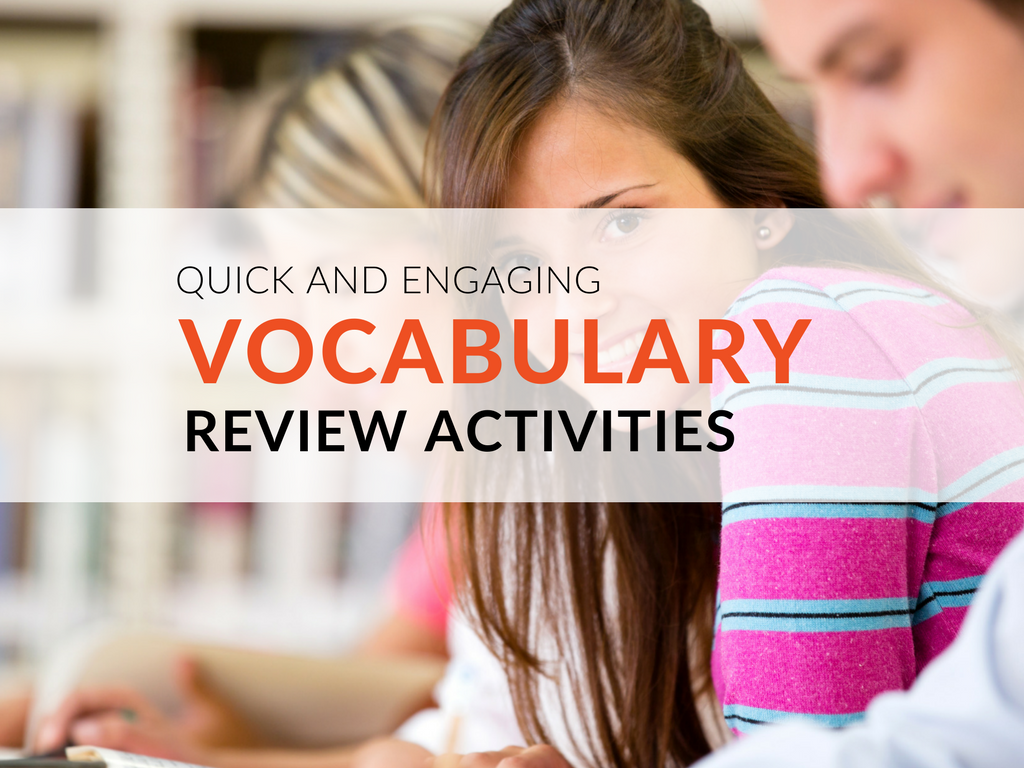
Ultimately, meaningful vocabulary instruction all boils down to three words: integrate, reiterate, and relevant. When you integrate vocabulary throughout your entire period or school day, reiterate words often, and show their relevance to students, students want to learn new words!
Quick Daily Vocabulary Review
STEP 1: STAND UP UNTIL YOU CAN GIVE A DEFINITIONI ask all of my students to stand up (not all acquiesce right away-I still call on them), and when I say a word, the first person to raise their hand and give me a definition can sit down. The students are anxious to sit down, so it’s a quick and easy way to review.
STEP 2: TALK ABOUT CHARACTERS WITH VOCABULARY WORDS We just finished studying The Great Gatsby in one class and are in the middle of Raisin in the Sun in another class. I asked the students to list the main characters in their book and then list vocabulary words that define each of their personality traits. They especially enjoyed using individual whiteboards to make their lists.
If you don’t have individual whiteboards you could use my Many Faces of Vocabulary printable to have students create and write about the main characters.
STEP 3: CATEGORIZE YOUR WORDSI ask my students to put vocabulary words in a few different categories-insults, compliments, travel/time words, responsibility words, etc. Students have to put in 10 words for each of at least three categories (they could also create their own categories).
The conversations I had with students were interesting- the word decadent is a compliment when talking about decadent desserts but an insult when talking about the decadent Roman empire. My students were able to discuss the nuances of words through our category discussions!
Quick Vocabulary Review Games to Use in Centers
The easiest way to review new and past vocabulary words is with vocabulary games. Leading up to semester exams I periodically set up centers of vocabulary games and have students rotate through the stations to review past words.
PRINTABLE 1: VOCAB-ZEE DICE GAME
Vocab-Zee Dice Game, similar to Hasbro® Yahtzee ™, is the perfect vocabulary game to use in centers for review. Students will perform vocabulary-based actions that coincide with the dice numbers they roll.
To play the Vocab-Zee Dice Game you will need to break students into groups of 3-5 players. Each group of students will need 5 dice and the Vocab-Zee Dice Game rules. During each turn, students have up to three rolls to try and achieve the best possible set of dice. Once students have completed their three rolls, they look at their dice and, based on the numbers, have to perform vocabulary-based actions in order to earn points.
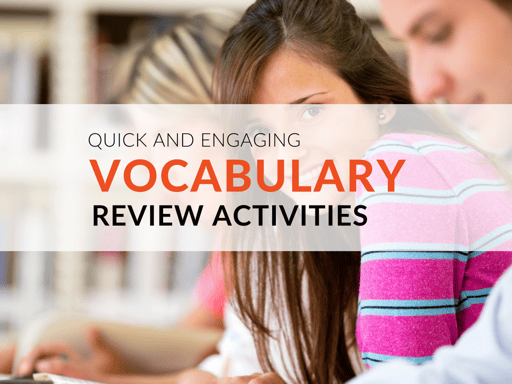
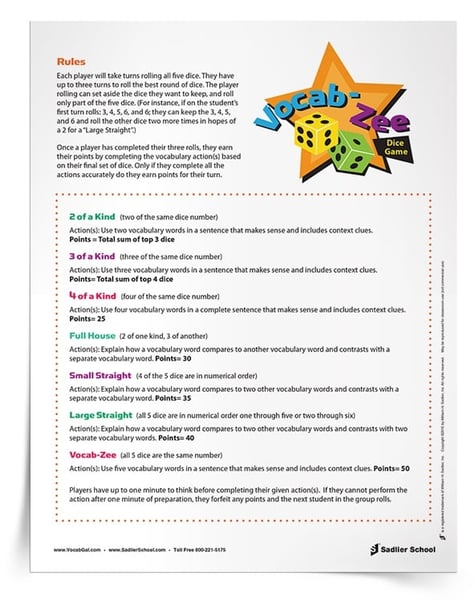
PRINTABLE 2: GO FISH VOCABULARY GAME
The Go Fish Vocabulary Game is a fun, relatively quick game that helps students master a few of their trickier vocabulary words.
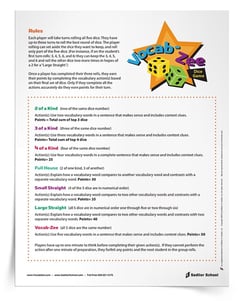
PRINTABLE 3: PICABULARY GAME
The Picabulary Vocabulary Game, similar to Hasbro® Pictionary™, is a quick and often hilarious way to review vocabulary words! Divided into teams, students have to creatively draw out vocabulary word meanings for their teammates to guess. The team with the most points wins!
To use this game in classroom centers for review, all you need are the instruction and a whiteboard.
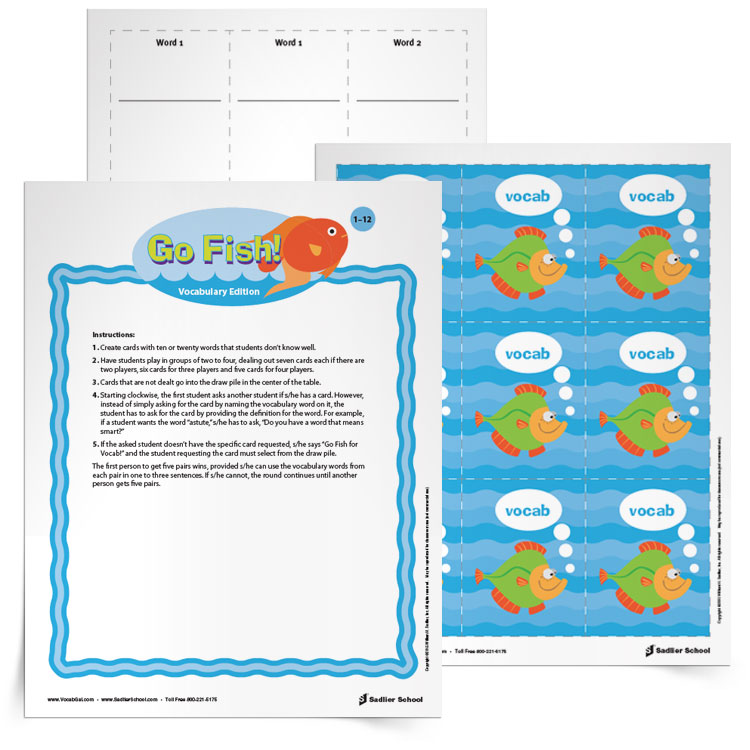
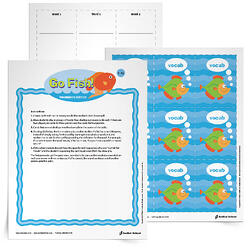
PRINTABLE 4: VOCAB LAND GAME BOARD
A beautifully-designed version of Candy Land where students must write in and then use vocabulary words to move along in game play. It’s wonderful how the artwork in this game can remind students of earlier childhood memories and therefore make word learning seem like child’s play.
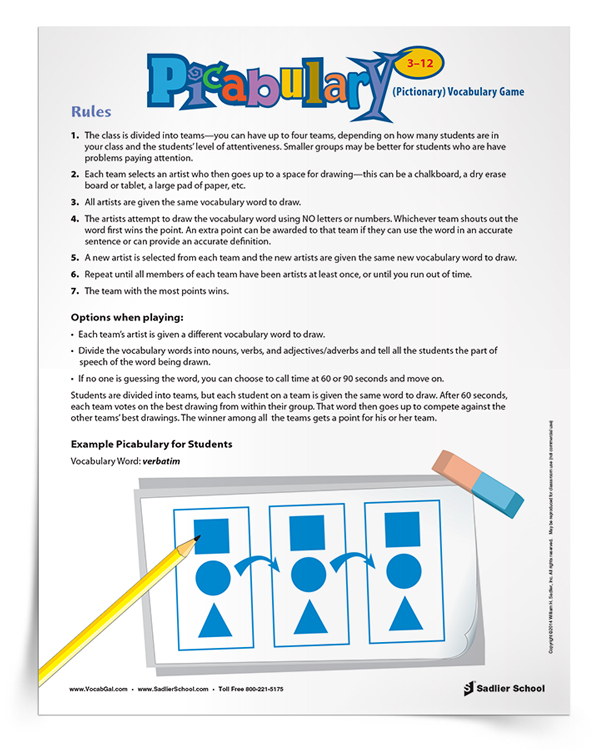
Class Starters for Quick Vocabulary Review
STARTER 1: TOSS THE VOCABULARY WORDS
Click to get all of the details.
STARTER 2: CELEBRITY THROWDOWN
Click to get all of the details.
STARTER 3: ROUND ROBIN STORY
Click to get all of the details.
Give a Word, Get a Handout Vocabulary Review Activity
I have discovered a fun and simple vocabulary activity to keep my students on their toes (literally); instead of passing out papers to students as they are seated at their desks, I now ask them to get up and ask me for their handout using a vocabulary word. Students are not allowed to reiterate the same word as someone else, so they have to listen closely and be willing to adapt should their word be chosen. Most of my students would never admit it, but I think they like this vocabulary activity as they approach me with sly grins on their faces and share their question or statement to receive their paper.
Examples from last week:
“I do not wish to peculate the paper-can I please just have the handout?”
“I am bereft of a handout-please help me!”
“I am overwhelmed by lassitude yet have gotten up for my handout-please!?”
“The inclement weather outside may be ominous, but I still want to do my work!”
Students who are confused by what to do simply hang back and observe others; not only do they quickly figure out what to do, but they hear more vocabulary in context as they listen.
While it takes a little longer than a traditional paper pass, I enjoy getting my students on their feet to keep the blood flowing and their minds open to vocabulary practice! I have started to also use this vocabulary activity when passing back papers and have designated other students (who show a love of lexicon) to be my adjuncts and give out papers when students approach them with a properly designed vocabulary sentence. All in all, this use of words is a small yet powerful way to review!
Common Core State Standards:
Speaking & Listening Standard 1. Prepare for and participate effectively in a range of conversations and collaborations Speaking & Listening Standard 6. Adapt speech to a variety of contexts and communicative tasks Language Standard 1. Demonstrate command of the conventions of standard English grammar and usage when writing or speaking. Language Standard 3. Apply knowledge of language to understand how language functions in different contexts. Language Standard 4. Determine or clarify the meaning of unknown words Language Standard 6. Acquire and use accurately a range of general academic and domain-specific words and phrases; demonstrate independence in gathering vocabulary knowledge






